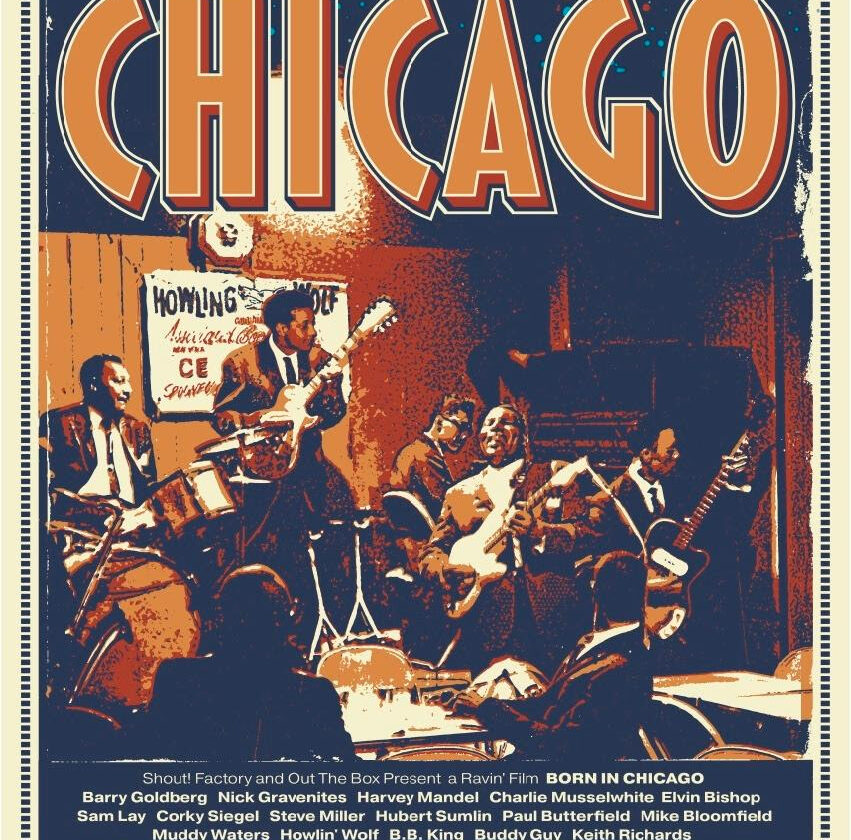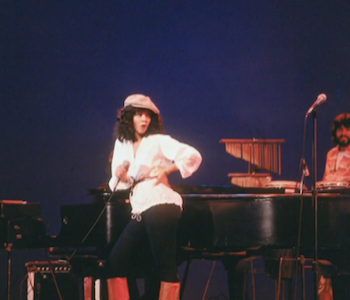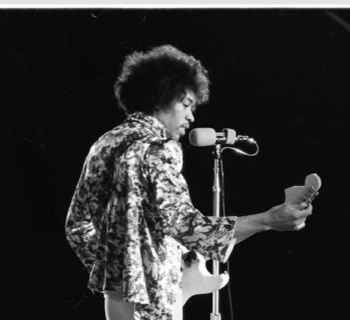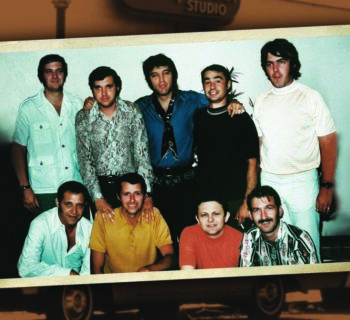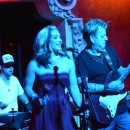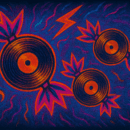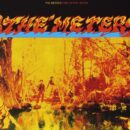Veteran music business legend Marshall Chess is the son of Leonard and nephew of Phil Chess, the dynamic duo who founded the monumental Chicago-based blues label.
After departing from Chess Records in 1969, Marshall formed and served as President of Rolling Stone Records for seven years. He helped create the Rolling Stones famous tongue and lip logo and was involved as Executive Producer on 7 Rolling Stone #1 albums during the 1970’s.
Marshall Chess is prominently featured and interviewed in the new Born In Chicago blues documentary that will be available from Shout! Studios and Out of the Box Records on all major digital platforms on August 1, 2023.

BORN IN CHICAGO, a Ravin' Film, was written by music historian Joel Selvin, and includes incredible archival footage alongside interviews with Keith Richards, Bob Dylan, B.B. King, Buddy Guy, Steve Miller, Harvey Mandel, Charlie Musselwhite, Barry Goldberg, Hubert Sumlin, Corky Seigel and many others.
Narrated by Dan Aykroyd and Executive Produced by Jim Belushi and Elliot Roberts, BORN IN CHICAGO was co-directed by Bob Sarles (BANG! The Bert Berns Story, Sweet Blues: A Film About Mike Bloomfield) and John Anderson (Horn From The Heart: The Paul Butterfield Story, Brian Wilson Presents Smile). Original music for the film was composed by Jimmy Vivino and Barry Goldberg.
From the Shout! Studios media announcement. “In the late 1950s the dynamic Chicago blues scene was at a crossroads. The music's patriarchs - Muddy Waters and Howlin' Wolf - were still vital and playing regularly at the many blues clubs on the city's south side. But the scene had peaked, as young African Americans were discovering the sounds of Motown, Stax and the soul of James Brown. The new generation saw the blues of their parents and grandparents as antiquated, a remnant of an era best left to the past.
At the same time white adolescents in the suburbs of Chicago and other cities, were listening to black radio stations late at night and were just discovering this mysterious and forbidden music. In the early sixties young white musicians from Chicago's suburbs began to venture to Chicago's South side to see in person the music they had been hearing on the radio. Soon, these musicians, among them Mike Bloomfield, Barry Goldberg, and Harvey Mandel, befriended their musical heroes and soon became accepted among the musicians playing at Chicago's black blues clubs. BORN IN CHICAGO, a new feature documentary, tells this fascinating story through the voices of those who were there and extensive use of rarely seen archival footage.
BORN IN CHICAGO is enjoying an overwhelmingly positive reception on the film festival circuit, having been selected as “Best Of Fest” at the Palms Springs International Film Festival, winning the “Best Documentary Director” and “Best Sound Design” awards at the FirstGlance Philadephia Film Festival, and winning an Award in the category of “Best Documentary Feature” at the Hollywood Blvd Film Festival.
The film has also had successful screenings at the Mill Valley Film Festival, San Francisco DocFest, the Garden State Film Festival, the Portland Film Festival, the Pan African Film & Arts Festival and The Grammy Museum. BORN IN CHICAGO will screen at the upcoming New York City Independent Film Festival, The Washington, DC International Film Festival and as part of the 2023 The Chicago Blues Festival.”
Bob Sarles is a Primetime Emmy nominated film and television editor, producer and director. Sarles co-directed and edited the feature documentary BANG! The Bert Berns Story which premiered at SXSW. He directed and edited the documentary SWEET BLUES: A Film About Mike Bloomfield, as well as films displayed at the Rock and Roll Hall of Fame in Cleveland, the EMP Museum in Seattle, and the Stax Museum of American Soul Music in Memphis. Sarles produced and edited the television documentary The Nine Lives of Ozzy Osbourne for A&E and directed and edited the documentary short Yo Cip! He is currently working on the production of An Impolite Film About Paul Krassner.
John Anderson is a Grammy-nominated and Emmy-winning Director, Producer and Editor. John’s work has aired on PBS, A&E, MTV, VH1, Showtime, Cinemax, HBO, FOX, ABC, NBC, CBS, MuchMusic, the BBC and elsewhere around the world. John was nominated for a 2006 Grammy for his direction of Brian Wilson Presents SMiLE, which marked Anderson’s fourth collaboration with the Beach Boys leader, following Imagination, Brian Wilson On Tour, and Pet Sounds Live In London. John Anderson’s directorial projects include Sam Lay In Bluesland, Horn From The Heart: The Paul Butterfield Story, The Beach Boys: Doin' It Again.
“The Chess brothers and their record labels were instrumental in popularizing the blues music of Chicago’s South Side,” Born In Chicago co-director and co-producer Bob Sarles emailed me in summer 2022. “Marshall Chess has kept that flame burning to the present day. His story about The Rolling Stones’ visit to the Chess Records studio is a highly entertaining part of our documentary.”
Born In Chicago Trailer:
https://vimeo.com/bsarles/review/579679761/74806b4ab8
Marshall Chess, born in Chicago, Ill. on March 13, 1942, and was raised during the heyday of the independent record business. Leonard Chess had a piece of a record company named Aristocrat Records in 1947, and later in 1950 he brought his brother Phil into the fold and the brothers assumed sole ownership of the company and renamed it Chess Records. They also operated a club on the South side of Chicago, the Macomba Lounge.
Marshall “started” in the family business at age 7 accompanying his father Leonard on radio station visits. For sixteen years Marshall worked with his dad and his uncle Phil, doing everything from pressing records, applying shrink wrap and loading trucks to producing over 100 Chess Records projects, eventually heading up the label as President after the GRT acquisition in 1969.
Over years the monumental Chess catalog has had various homes, including a 1975 sale to All Platinum Records, and eventually a couple of decades ago the Chess master tapes were purchased by MCA Records, now Universal Music Enterprises. The UMe label for many years has re-released top-notch Chess Records packages, compilations and boxed sets manufacturing product configurations for radio, retail, and digital streaming outlets.
Few pieces of audio art have been as influential as Muddy Waters' seminal debut album The Best of Muddy Waters, a piece of vinyl released by Chess Records label in 1958 that served as “The Big Bang” for rock 'n' roll and the ensuing half century of modern popular culture.
In 2017, Geffen/UMe celebrated the 60th anniversary of Waters' first album on Chess by reissuing The Best of Muddy Waters on vinyl in original mono for the first time in 30 years while also making it available for download and streaming for the first time ever, giving new and familiar listeners a reminder of the blues man's truly incandescent music.
Universal/Spectrum in the U.K. has also released a 2 CD compilation Can’t Be Satisfied: The Very best of Muddy Waters 1947-1975.
In mid-October 2022, Variety announced Sony Music Publishing signing a worldwide administration deal with the Muddy Waters estate. In spring 2023, the Liberation Hall record label recently issued for Record Store Day a previously unreleased Muddy Waters -Hollywood Blues Summit: Live at the Ash Grove July 30, 1971.
Chess Records showcased blues, rock ‘n’ roll, R&B, soul, jazz and comedy: Muddy Waters, Willie Dixon, Howlin’ Wolf, Bo Diddley, Chuck Berry, Little Walter, Buddy Guy, Jimmy Rogers, Sonny Boy Williamson II and Little Milton. Maurice White and Charles Stepney both learned their craft at the label. The label issued seminal efforts by Etta James, the Dells, Billy Stewart, and Fontella Bass. The Miracles, Four Tops, Bobby Charles and Dale Hawkins cut singles for Chess.
In addition, there was a jazz division with Gene Ammons, Ahmad Jamal and the Ramsey Lewis Trio. Argo, the jazz arm of Chess released material by Art Blakey & The Jazz Messengers, James Moody, Clark Terry, Zoot Sims, Kenny Burrell, the Art Farmer-Benny Golson Jazztet (with the debut recording of pianist McCoy Tyner), Ray Bryant, Roland Kirk, Oliver Nelson, Jack McDuff, Illinois Jacquet and John Klemmer.
In the late 1960’s Marshall created his own record label Cadet Concept, a division of Chess Records. He created and produced the Rotary Connection, which became the springboard for vocalist Minnie Riperton’s career. He signed John Klemmer and created a new format which was heralded as the first jazz fusion album, Blowin’ Gold. Marshall also produced the blues albums Electric Mud and After the Rain. The Chess comedy division offered long players by Moms Mabley, George Kirby, Pigmeat Markham and Slappy White.
Marshall Chess has produced 3 films. The Legend Of Bo Diddley, Ladies and Gentlemen, The Rolling Stones, and the rarely glimpsed 1972 Rolling Stones’ Robert Frank-directed tour documentary Cocksucker Blues. Chess is also a revealing interview subject in Robert Greenfield’s 2006 captivating book Exile On Main St. A Season In Hell With The Rolling Stones.
In 2004, Marshall was featured in a movie project collaboration titled Godfathers and Son’s directed by Marc Levin, for the PBS-TV series The Blues, produced by Martin Scorsese. Chess produced a hip-hop version of the classic Chess track “Mannish Boy” with rappers Chuck D and Common recording with members of the original Muddy Waters’ Electric Mud band.
In 2008, Marshall concluded a DJ stint hosting a weekly blues music program on Sirius Satellite Radio. His Chess Records Hour debuted in November 2006 and aired for 81 shows.
During 2009, I interviewed Marshall Chess in West Hollywood, California at the Sunset Marquis Hotel. In 2010 I spoke with Marshall by telephone from his office in New York City.
He spent a few hours with me discussing Chess Records, the label’s legacy, his personal relationship with the company’s artists, and working with the Rolling Stones.
Q: Can you explain how Chess Records worked? Can you even compare or contrast Leonard and Phil Chess? How could your uncle and father know so much about music, the blues, and bringing it to the world? They were Polish immigrants.
A: Because they were very bright people. They worked in black businesses. My dad had a liquor store. I sat around my uncle and asked, ‘everyone always asks me about music, and how did Chess get into music.’ And, my uncle’s vision is this. That in Poland, in the small Jewish ghetto town, there was no music. Then some guy got a windup victrola. And the whole fuckin’ village would stand underneath this guy’s window when he played it. That was the first recorded music they heard. They come to America.
My grandfather, who was here seven years prior in Chicago brings them. He had a scrap metal yard. Across the street from it, on the west side of Chicago, was a black gospel church. My uncle said that my dad and him were kids, and after work they would hear the bass drum and gospel singing with a piano, they would be fascinated. They would stand there and get punished for being late, ‘cause they were listening to the black music. That’s where it began to me.
For some reason it affected them. And then, when my uncle went into the army, my dad, I think because he was an immigrant got him near Maxwell Street, the black neighborhood. No prejudice. That’s just it. No blacks in Poland. You don’t get raised being prejudiced in Europe. You hate Nazis, but no blacks to hate. So, they had no problem, and they saw that there was this giant influx of blacks in Chicago, and they had money, and they were working. And my dad started with a liquor store after he worked in a shoe shop. Berger’s shoes. Then the liquor store, where he had a jukebox, and he was there 15-18 hours a day hearing blues. I watched the jukeboxes being serviced. They used to be controlled by gangsters of Chicago. They’d come and pick ‘em up from us. The Italian gangsters.
Q: Can you offer some reflections about the Chess studio?
A: We had fabulous engineers. Ron Malo and Malcolm Chism. They were the two best engineers. Ron came from Detroit. He had worked on Motown studios and he was a big part. Before Ron, we had these two Weiner brothers, who actually built the studio. It was a basic classic studio design, with the echo chamber in the basement, very small control room.
One of the secrets of the Chess studio was not the studio but our mastering. We had a little mastering room with a lathe. Eventually we had a Neumann lathe. The first one was an American one. We did our own mastering and had these Electrovoice speakers on the wall.
The great part about that room that when it sounded right in that mastering room it would pop off the radio. That’s what it was all about. And the Rolling Stones, the Yardbirds, later Fleetwood Mac had to make visits there.
Q: The Chess sonic delights are amazing.
A: The best explanation is, this may sound way out. It contains magic. The most apparent magic that we can see or experience is music. Let’s face it. Music changes the way you feel. That’s magical. Chess Records for some reason was a magnet for amazing artistry and all these magicians came to Chess. And we were able to capture it. And it’s something that can be experienced through audio. The music has stood up without a cinematic aspect like video. And the method of recording.
As I grew older, and was a person of the hippie generation, and discovered things like meditation, psychedelic drugs, Buddhism. I realized what was happening in the early Chess studio was like a high Buddhist monk meditation manager. Because when you recorded in mono and two-track with 5 or 6 players and a singer there wasn’t any correction possible. One of the main jobs as a producer was like a meditation manager master. He had to get the band locked together to go down. I remember when they were teaching me to produce, they always would say, “When the motherfucker fucks up, you got to embarrass him and tell him to play that shit right. Over and over.”
Q: The very important Vee-Jay Record label was across the street from Chess in Chicago.
A: Ewart Abner was a good friend of mine. The Vee-Jay stuff came later. It was more on the edge of ‘60s. That led into the Impressions, Curtis Mayfield, all that part of Chicago. The thing that this early music has is that it just has some fuckin’ kind of magic in it. I think maybe it’s the direct to two-rack recording of the period. I don’t know what it is. Some kind of alchemy. A real esoteric alchemy. That’s what drew the Stones to record in our studio. There’s some alchemy in those early records that even carries over when you sample them. Jerry Butler and Dee Clark. Brilliant singers. Amazing. They all come from black church. Etta. Every one of them. This is the shit, man. All these motherfuckers learned from church, or the fuckin’ cotton fields in Mississippi.
I love Chess Records. Because it was the greatest, happiest place in the world. You would love going there. You laughed all fuckin’ day. The artists hung out there, no, not all the artists, but what we would call the family artists. Sonny Boy, Muddy Waters, Dells, Chuck Berry, Bo Diddley.
Q: And Billy Stewart!
A: Billy Stewart shot the doorknob off at the studio if they didn’t let him in quick enough. What was Billy Stewart mad about? ‘I brought some fuckin’ pepper stuffed crabs from Baltimore. You gotta taste them before they get ruined!’ We were into eatin’ and laughing. Maurice White is the drummer on Billy’s ‘Summertime.’ I saw genius in him. He was the first black guy that ever had a Volkswagen. He was like the first of the switch from the Cadillac to the cool.
I’m proud and I’m thrilled, and helped historically continue the legacy of the Chess Records label. I’m not a classic blues fan, a blues collector, I am not into the anal aspect of what guitar strings Muddy used, or what harmonica did Little Walter play.
I only wanted to be around my family, and my father, who was a workaholic. It was a family business. They were immigrants and embraced that. For age 7 to age 12 or 13, my dad took me on the road, not because I wanted to be in the record business but because I wanted to be with my father. So, I got it really by osmosis, ya know. And that was my real reason for hanging out there.
Q: In Hollywood at Fairfax High School, your Fathers and Sons album, recorded live in April 1969 in Chicago, was released with Muddy, Otis Spann, Sam Lay, Buddy Miles Paul Butterfield, Michael Bloomfield, and Donald “Duck” Dunn was the big hit in the school hallway with collectors and stoners. It was reissued earlier this century by Universal Music Enterprises. The version of “Long Distance Call” is amazing!
A: Man, and live, you couldn’t see it, Muddy did this dance on ‘Got My Mojo Working’ that was unreal! Like Nureyev. He put down his guitar and did a pirouette. The place went wild! You can hear it on the record. You can hear the crowd when that happens.
Q: What sort of images flash in your head when you play the music of Chess Records?
A: I see them. My dad and uncle. Man, that’s what goes through my head. Sonny Boy Williamson and Muddy Waters went to my Bar Mitzvah. A lot of black people were there, which was a very unusual event back then in 1955.
The Chess recording artists were always writing about women problems and sex. That’s all I ever heard from them when I was a kid. I saw some of these records being recorded. I sold them originally. I helped their initial exposure. On the SiriusXM radio program I brought more exposure.
But being around the blues, and all these records being made, and knowing the artists, I don’t know, man, it just, ya know, got into me. It just became part of me. It’s part of my life. I’ve never even considered it work. I appear and promote Chess and the blues in films and TV documentaries. I do as much as I can because I get a buzz out of it. I’m just amazed, man, that this music that we made in Chicago has become so historical
Q: In the Chess stable as far as songwriters, who was your main man?
A: Chuck Berry was the best. He had a spiral notebook, a fuckin’ school spiral book. I saw all those lyrics written out. Like poetry, man.
Q: The earliest I saw Chuck Berry was 1969. He was having pickup bands even then.
A: A pick up band… In the mid to late 1950s he was just brilliant. Johnnie Johnson on piano. I don’t remember much. The first session I remember in detail when he came out of jail was ‘Nadine.’ I was his road manager for six gigs. I brought him his clothes when he came right from the prison. My dad gave me $100.00 to take him down next to the Chicago Theater on State Street to buy him a new outfit. And then we went on tour. The first gig we did was in Flint, Michigan, with the Motown rhythm section backing him.
Q: I never got to see that…
A: Chuck was great. But I always felt he was too greedy. He ruined the alchemy because those pickup bands, as good as they knew it, weren’t locked, like if it would have been his own band. That’s why in Keith’s movie he had all those problems with Chuck. He wouldn’t lock. And he lost it. He needed my father there. I don’t know if I could even deal with it. My dad was the one. As for guitar playing, he invented that whole thing, ya know. And he sang and wrote the words, too.
Q Run down some of the other Chess artists. Howlin’ Wolf. I loved it when he was on Jack Good’s Shindig! television show in 1965 when the Rolling Stones were booked.
A: Howlin’ Wolf…On stage very commanding, but off stage a very gentle, soft man. I remember him telling me he was learning how to read music. Did you know that? He went to school to learn how to read music so he could learn how to play the guitar. He wanted to learn notes. One time my dad had me bring him a thousand dollars to his house, and he opened like those tool boxes that you lift off the tray at the top. And it’s stacked full of money. “What do you need this money for?” “I gotta go buy some special dogs to go huntin’ on my farm.” (laughs). He was a gentle man but ferocious. Big. He used to drink a lot. He was pretty much high a lot when he performed.
Q: Muddy was the showman and a towering regal figure.
A: Muddy liked to drink. Muddy on stage and in the studio was the best. He was organized. He was a fuckin’ leader. I always say this. People say ‘what do you mean?’ He was a fuckin’ leader. Muddy was the reincarnation of a tribal chief, of a President, of a King. Such a powerful presence. I just loved him. And he treated me so good. He used to call me his white grandson. His wife Geneva used to send me fried chicken wrapped in foil. Muddy once wrote a poem to a girl for me that I gave when I was in high school. I always say this and people laugh but most of what I discussed with these guys was about sex. That was the main thing on their mind.
In the fifties and very early sixties there were clubs, during that early blues heyday of Muddy, and Wolf, they were places where people went primarily on weekends to find women. And women to find men and to party. And the music was very much party music. It was like a psychological influence on the people in these little clubs. And it was what these guys wanted to do. Drinkin’ and make love.
It then began to die out as R&B and Motown happened. It’s a period when I was in a few of those clubs that were hot and steamy and smelly and funky and the music was loud. Those were the clubs where Muddy Waters put the coke bottle in his pants and Wolf got down on his knees, howling, drinking whisky out of a bottle. Those were a whole different audience then when the white blues market discovered it.
Look at their lyrics. With the TV programs recently on Muddy. The American Masters documentary, it’s all very gratifying. We always knew it. Gratification is the best word. Not for all of them. Muddy, Wolf, Chuck Berry. These are like Beethoven and Bach. They should be right up there.
Q: Buddy Guy?
A: Buddy Guy brought me a real moio from Mississippi that I used to wear when I was in high school that I used to wear when I was trying to get girls. This little pink bag I pinned to my under shirt.
Q: Bo Diddley?
A: I have always considered Bo Diddley to be one of the most creative, innovative and original of all the Chess artists. From his custom guitars that he built himself to his constant searching for new sounds. He has influenced many recording artists with his originality. He was not afraid to take chances with his music. Chess Records was the perfect place to be as we to were not afraid to experiment with new sounds and ideas. During the 50’s both Bo and Chess were always ready to push the envelope. Brilliant artist. A true original. Great artist. But he’s a trip.
The thing I remember about Bo, and here’s my memory. I remember Bo with this long airport limousine broken down in front of 2120 S. Michigan Ave. on his back repairing it himself in the street jacked up changing the rear end or something. On the curb. You know what I told Bo Diddley? “The reason you’ve never had another hit is because your creativity is tied up in bitterness. I said let that shit go and you can have a hit tomorrow. You’re a fuckin’ genius.”
Q: Willie Dixon?
A: Willie Dixon. Songwriter, producer, bass player. He’d get the bands together. I think he was a great songwriter and a great –promoter and a real hustler and he was a great guy. He was very important to the success of Chess and I will not take that away from him. He wasn’t Chess at all. But he was an important part of Chess Records. Very important part of that blues era.
Q: Etta James?
A: The Queen of Soul’ They were calling her that before Aretha (Franklin). She’s just great. She started singing in church. She’s a real L.A. girl. A street girl. Johnny Otis broke her out on Modern, and then she had that hit “Roll with Me, Henry” that was later re-titled “Dance with Me, Henry.”
In 1960 she came to Chess and our Argo label, and then another hit in ’61 with “At Last.” In 1967 came “Tell Mama.” Both great records. They blew our minds. We loved good shit. We knew when it was good. (Laughs). We had black radio in our pocket. We were strong. Not only that, we had a radio station WVON. (Voice Of The Negro) which was part of it. E. Rodney Jones was our program director.
Q: Little Walter? People are still talking about him.
A: He’s the truest genius of all the Chess artists. Because he invented and perfected a new way to play the harmonica, and did it with tremendous creativity and talent. Very much like Hendrix with guitar. They’re exactly alike. Miles Davis considered Walter a genius. Hendrix considered Walter a genius. I liked him as a person but he was always drunk. I never knew him when he wasn’t fucked up. Smelling of liquor. But, yeah, I liked him. There was something ‘sloppy drunk’ about him that I liked. But he had a mean side to him, too. I saw him and my dad go at it with anger numerous times when he was drunk. He’d be a mean drunk. But we loved him. And my dad and my family loved him. We buried him.
Q: You issued Electric Mud by Muddy Waters and have been defending it from the day of retail release.
A: Here’s the true Electric Mud story. I produced it. I recorded it and promoted it. At that time, I was very aware and very on top of alternative FM radio. I drove across the United States, visiting FM DJ’s like Tom Donahue and Bobby Mitchell in San Francisco. I’d meet all the DJ’s at radio stations in Los Angeles like KMET-FM and KPPC-FM and meet all these people. And these guys would be smoking joints on the air and they’d take an album right from your arm and play it immediately five times on the air!
Q: FM “Underground” radio gave airplay to blues recordings during 1967-1972.
A: Those were the great days. I was part of the generation. When everyone took LSD to watch the Grateful Dead, I did. I’ve been at the Fillmore West sitting on the floor. What happened to me was that I was part of that sex, drugs and rock ‘n’ roll generation. And it blew my mind.
Bill Graham was the greatest for that for the blues artists of that era. B.B. King on the bills. FM radio was a Godsend for the blues. The big commercial AM stations would not play the records at all except some black stations. And I decided to repackage Chess to that market that was getting stoned and going deep. It was a big boost when the English groups covered the music earlier. On records and at their shows. We loved it and something we thought could never happen.
Muddy Waters and B.B. King really dug white people doin’ their stuff. Sonny Boy was very much into white people doin his stuff. So was Howlin’ Wolf. I remember (Eric) Clapton gave him a fishing rod. Wolf was a real sportsman. He had fuckin’ huntin’ dogs that were a thousand dollars each. It blew our mind, of course it was a fantastic thing. We loved it. And we never thought that could happen. It was a total fantasy. But we first noticed it with the Muddy At Newport album came out.
See, albums were not selling to black people. They didn’t have record players. I can remember we got all these orders from Boston on the Muddy album and we knew it was white people buying it. College kids. The first things we noticed as the album market developed. •
(Harvey Kubernik is the author of 20 books, including Leonard Cohen: Everybody Knows published in 2014 and Neil Young Heart of Gold during 2015. Kubernik also authored 2009’s Canyon Of Dreams: The Magic And The Music Of Laurel Canyon and 2014’s Turn Up The Radio! Rock, Pop and Roll In Los Angeles 1956-1972. Sterling/Barnes and Noble in 2018 published Harvey and Kenneth Kubernik’s The Story Of The Band: From Big Pink To The Last Waltz. In2021 the duo wrote Jimi Hendrix: Voodoo Child for Sterling/Barnes and Noble.
Otherworld Cottage Industries in 2020 published Harvey’s book, Docs That Rock, Music That Matters, featuring interviews with D.A. Pennebaker, Chris Hegedus, Albert Maysles, Murray Lerner, Morgan Neville, David Leaf, Dick Clark, Curtis Hanson and Michael Lindsay-Hogg.
Kubernik’s writings are in several book anthologies, including The Rolling Stone Book Of The Beats and Drinking With Bukowski. Harvey wrote the liner note booklets to the CD re-releases of Carole King’s Tapestry, The Essential Carole King, Allen Ginsberg’s Kaddish, Elvis Presley The ’68 Comeback Special, The Ramones’ End of the Century and Big Brother & the Holding Company Captured Live at The Monterey International Pop Festival.
By Harvey Kubernik Copyright 2010, 2023

